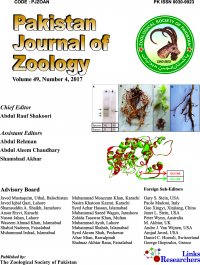1Key Laboratory of Adaptive Evolution and Ecological Conservation on Plants and Animals in Southwest Mountain Ecosystem of Yunnan Higher Education Institutes, School of Life Sciences, Yunnan Normal University, 1st Yuhua District, Yunnan Province, Kunming 650500, China
2Yunnan College of Business Management, Kunming 650106, China
* Corresponding author: zwl_8307@yahoo.com
ABSTRACT
Plant secondary metabolites affect the survival, reproduction, and distribution of herbivores. In order to test the effects of plant secondary metabolite on energy metabolism and thermogenesis, changes in resting metabolic rate (RMR), nonshivering thermogenesis (NST) and energy intake were measured in Eothenomys miletus fed diets containing 0, 3.3% and 6.6% tannic acid, respectively. The results showed that E. miletus fed the diets with 6.6% tannic acid increased RMR compared with control on day 14, and reduced the gross energy intake (GEI) and digestible energy intake (DEI). On day 28, E. miletus fed diets containing tannic acid showed no significant changes in RMR, GEI and DEI. The apparent digestibility and NST were kept stabled during the experiment. These results indicated that tannic acid can increase RMR and reduce energy intake within a short period and the changed physiological function returned to baseline for a long period. Tannic acid has no effect on body mass and no significant difference was detected in NST between pre- and the end of experiment in E. miletus. All of the results indicated that E. miletus can adjust their physiological functions to match the changes in food conditions.
To share on other social networks, click on any
share button. What are these?










